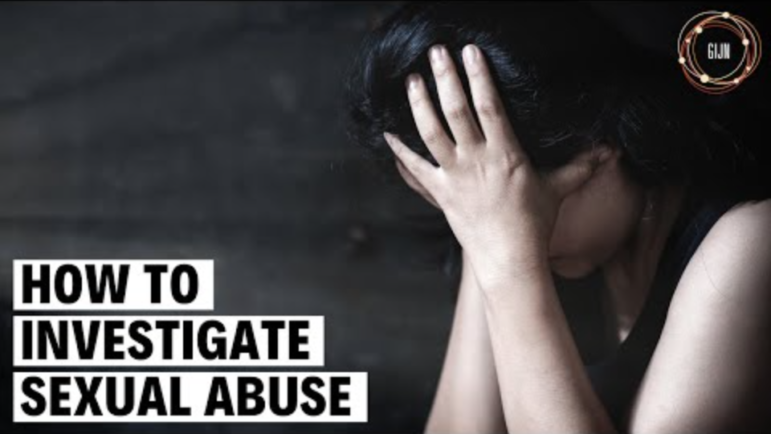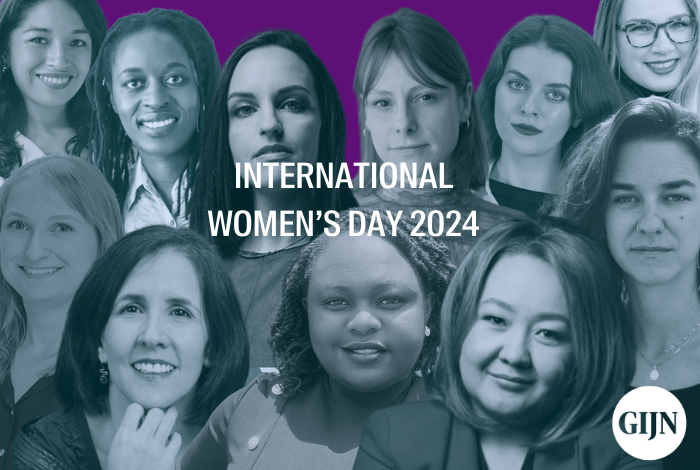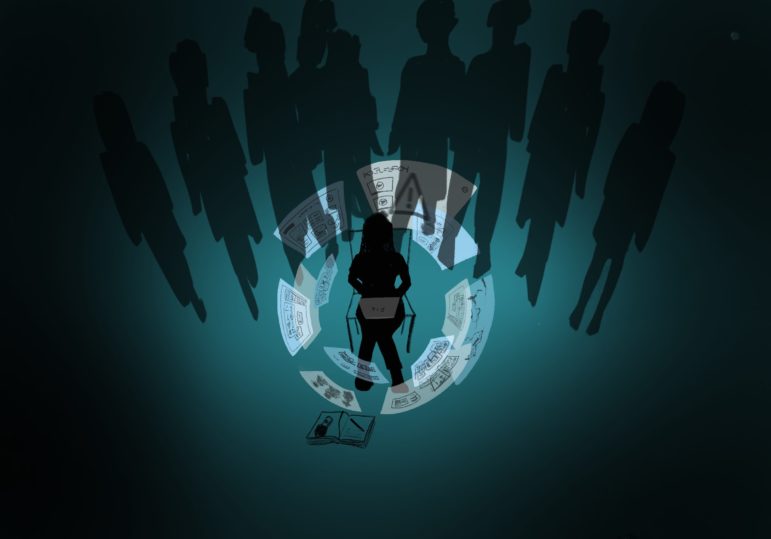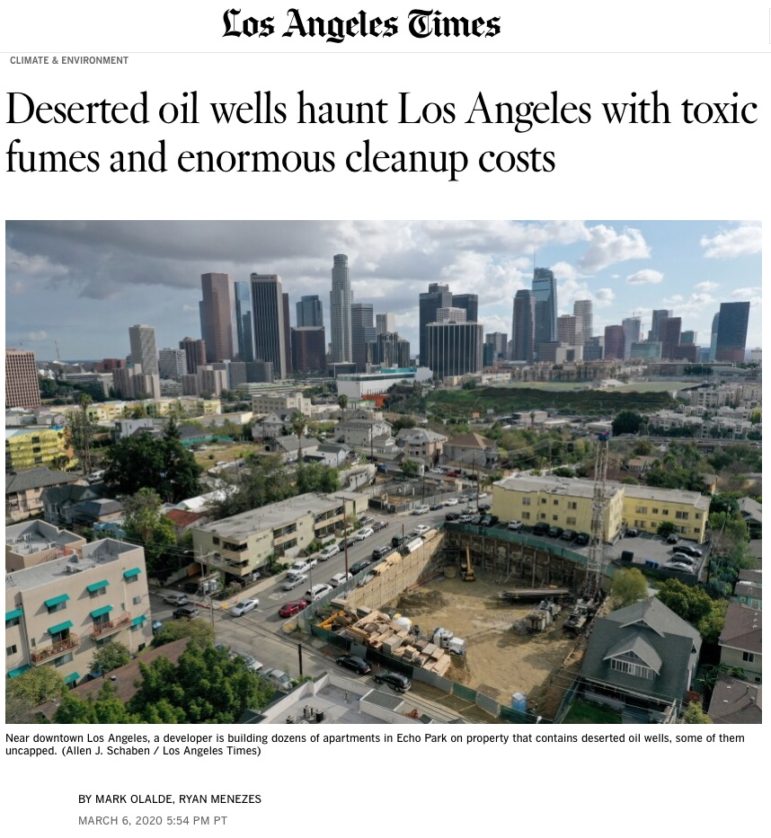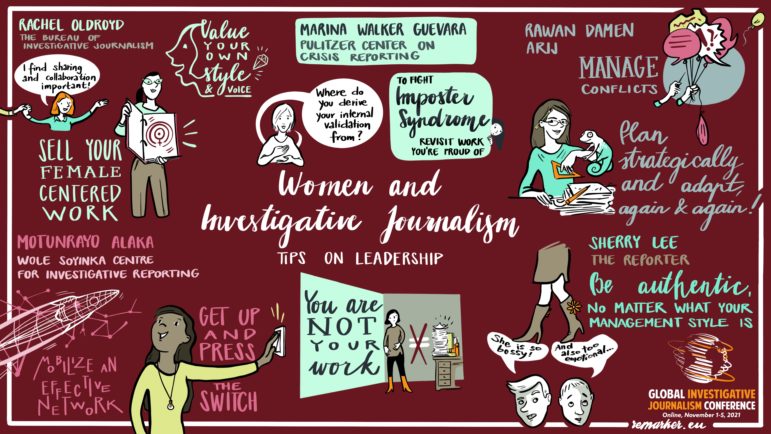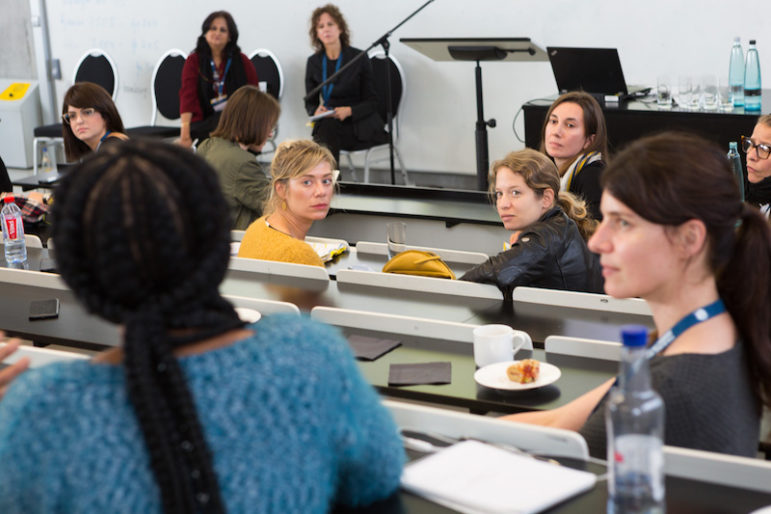

A networking session for women at the 11th Global Investigative Journalism Conference. Photo: Nina Weymann Schultz / GIJN
Women Investigative Journalists on Work and Life

A networking session for women at the 11th Global Investigative Journalism Conference. Photo: Nina Weymann Schultz / GIJN
Working as an investigative journalist is difficult; working as a woman investigative journalist adds extra layers of challenge, complexity, and frankly, aggravation and even harassment. At the 11th Global Investigative Journalism Conference in Hamburg (#GIJC19) in September, the many pressures of being a woman investigative journalist were on the agenda.
The largest gathering of investigative journalists from around the world takes place every two years. Co-hosted by GIJN, this year we were joined by our German partners, Netzwerke Recherche and Interlink Academy. #GIJC19 achieved a number of notable accomplishments. Along with a record crowd of 1,700 journalists from 130 countries, the conference achieved gender parity with both speakers and attendees. In addition, the majority of the conference organizing committee members were women, the conference included sessions focusing on issues of concern to women journalists, our keynote speaker was a woman, and childcare was available throughout the conference.
More and more women muckrakers are breaking important stories around the world. But despite increasing numbers and, to a lesser degree, more senior women in the business, there is still much to be done to fight inequality and discrimination. Women journalists, too, often pay a high personal price, and suffer from long hours and high levels of stress. It’s important to discuss these issues while celebrating the inspiring work being done by women muckrakers all over the world.
Survival Strategies
In one of the most popular and widely talked-about sessions at the conference, 10 women journalists shared their personal experiences, illuminating the state of journalism and the range of issues women face. They also spoke of their many “survival strategies,” practical ways to deal with obstacles they regularly confront.
At worst, these issues include sexual violence.
Shiori Ito, an independent journalist and filmmaker, is renowned for her book, Black Box, which documents her experience of rape by a senior journalist, and her unsuccessful efforts to have criminal charges brought against him. It’s a disturbing account that reveals profound sexism in Japan’s media and its institutions. In the session, she spoke about having to leave Japan to keep working as a journalist. The massive backlash and threats against her continue and she is being sued by the man she says raped her.
Ito spoke of her isolation and her wish for recognition and solidarity by Japanese media. But she also said this: “Maybe the story is personal and hard to face, but we have the tools and ability to investigate and that’s the power we have.” She said her investigative work and the solidarity of other women help her to deal with ongoing trauma.
Minna Knus-Galan, an investigative reporter for TV at Yle, the Finnish Broadcasting Company, shared that she was publicly called “an inexperienced girl reporter” — as a highly experienced journalist of nearly 40. Despite the fact that Finland is near the top in indices measuring press freedom, corruption, and socio-economic development, sexism remains endemic, she said. Calling out sexist comments and behavior is very difficult even in societies where men and women are apparently equal, as the MeToo movement has so clearly shown.
Alongside sexism and sexual abuse, stress was a recurring theme in these personal stories. Covering extreme violence can create stress and trauma in all journalists.
Marcela Turati, co-founder of Quinto Elemento Lab in Mexico, gave a moving account of how she and other female colleagues have tried to deal with the pain and fear — and the endless nightmares — from such reporting assignments as covering the victims of the drug war.
Women reporters thought they had to hide their fear from managers to avoid being reassigned to other beats, and so they weren’t seen as weak. So they drank and shared their thoughts and feelings in bars. But Turati and other women reporters knew they had to find better coping strategies, and they started sharing their feelings more openly with each other. They set up a WhatsApp group for mutual support when reporters needed to talk; they created “emotional deadlines” for female reporters who needed a break from reporting draining stories like the discovery of mass graves; they met in child-friendly locations; they went temazcales, traditional saunas, taking time out to share experiences in a relaxed setting; and they even invited shamans to give spiritual support to those who requested it at trainings on how to cover human rights abuses. She ended by asking us all to consider the many “non-macho ways” of dealing with stress, pain and violence – advisable for men as well as women.
The Real Story
Juliane Löffler, a reporter with BuzzFeed News based in Germany, says her reporting on the survivors of sexual violence left her feeling exhausted and guilty about feeling exhausted. This led her to think about the mental health of reporters and she made a number of suggestions, including the critical necessity to take breaks, and to think about what you need to keep working effectively as a reporter. Löffler said she has a habit of making a list of all the stakeholders who might be interested in a specific story. One of the first things she does when the story is published is to send it to the stakeholders so the findings can be disseminated as widely as possible and so having done her part, can wait for the impact that will take the story further.
The themes of stress, overwork, and the loss of equilibrium figured in Miranda Patrucic’s contribution as well.
“Would you like to hear my Instagram story or my real story?”
This was her introduction to a frank account of how long hours and working on difficult investigations over a prolonged period of time led to burnout. This came with memory loss, panic attacks, inability to focus, brain fog, and exhaustion.
Patrucic is an investigative reporter and regional editor for the Organized Crime and Corruption Reporting Project based in Bosnia. She has reported on important stories no one else was telling in Central Asia and won many accolades and awards. But at the same time because of her punishingly long hours and stress, and the too-high expectations she had of herself, she felt like she was “falling apart” — failing, she said, just at the moment when she was most recognized and successful. She became very ill and had to take six months off to recover. She has learned to pace herself and to sleep, she said — and she has learned that she can’t be perfect — “at least all of the time.”
Knus-Galan also spoke about how to face the mental pressures brought on by the stress of difficult investigations – the “shitstorms,” she called them. When working on a story, “document absolutely everything”; don’t let inevitable criticism of your story get under your skin; share nasty, critical emails with your managers and colleagues — good bosses should act as a buffer to absorb and deflect criticism; support colleagues and remind yourself of all the amazing women investigative journalists.
This last suggestion came up frequently.
Löffler, for one, also makes a point of closely following how women are being treated in newsrooms in Germany, not only in her own. It’s necessary, too, she said, to keep confronting the stereotype of the intrepid investigative journalist – a lone wolf who travels the world, returning with major scoops. She spoke of the necessity of professional psychological support for journalists and ended on the importance of vacations, time offline, and also her garden — “a place to pause.”
Protecting yourself from threats of all kinds — psychological and physical — was highlighted by Asha Mwilu, an investigative journalist and special projects editor for Kenya’s Citizen TV.
She said that her experience of reporting important but dangerous stories without real support put her in serious danger. The wake-up call came after a couple of very close calls. The most important thing she has learned is not to be reckless.
“I learned to say no,” Mwilu said. Say no unless the investigation is funded properly, don’t work alone (she recruited a male journalist she works closely with), build a community, and take responsibility for your own security. “At the end of the day it is about your life. The story is important but you are even more important.”
Quiet Conversations
“Thoughtfulness,” as Alejandra Xanic von Bertrab put it, is essential. She is a co-founder of Quinto Elemento Lab in Mexico and she emphasized how important it is to stop and think carefully about each step of an investigation and to pay real attention to your intuition – to raise the volume and give that smart inner voice a chance. She also called on women journalists to celebrate good moments in an investigation, even the small achievements along the way, to help to master the inevitable highs and lows.
And for her, although sitting in front of the computer poring over documents and data is essential, “the streets are where the magic is” — a heartfelt recommendation to the room for an important part of reporting, and a way to help keep perspective. She also pointed out that journalists without children, like her, tend to overwork as they don’t have to stop to look after the kids – something to be aware of, she said.
Of course, working as a reporter and being a mother has is challenges.
Martha Mendoza, Pulitzer Prize-winning Associated Press reporter, spoke about what she called “the quiet conversation” she has with colleagues about combining work with parenthood. Her kids are grown now but when they were younger, she regularly took them with her on reporting trips, as long as they wouldn’t be put into danger. She relied on local babysitters when she was doing interviews, though occasionally took a child with her to an interview.
She said that when she interviewed Sheryl Sandberg, who was vice president of Facebook at the time, she told Mendoza “I can’t believe you would bring your kid,” and ended up giving her daughter a book and a T-shirt. Mendoza said she couldn’t have done her work without the support of her partner, a stay-at-home dad, and that although there are a lot of ways to manage work and family, support by colleagues was critical.
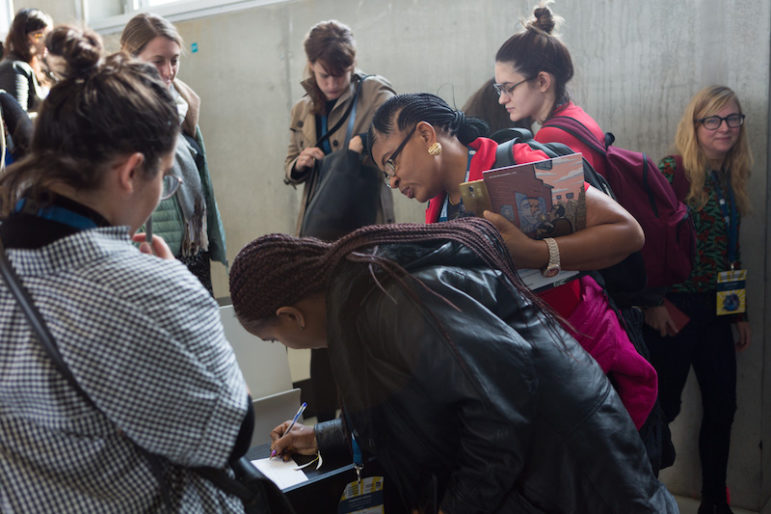
At a networking session for women at the 11th Global Investigative Journalism Conference. Photo: Nina Weymann Schultz / GIJN
Of course, support from management and the wider organization are critical as well.
Oriana Zill de Granados, a producer at CBS News’ 60 Minutes in the US, praised her employer. She says half of the producers are women and she says staff get great support for investigative reporting. She spoke of her responsibility as a woman journalist to select stories about or related to women, and to feature female interviewees prominently.
Patricia Evangelista described her employer, Rappler in the Philippines, as “a family, a matriarchy” with a long history of employing female reporters. She’s one of them and focuses on covering the drug war, truly harrowing work.
Evangelista described her managers as “well-meaning, interfering aunties who understand post-traumatic stress, as well as premenstrual syndrome, and who will know most of the time when you need a break.” The strict safety and security protocols at Rappler, Evangelista said, are reasonable and reassuring. Her advice was implicit but clear: reporters need managers who combine journalistic acumen with a culture of strong support and care.
The 90-minute lightning round ended far too soon but provided “a place to pause” and more. Xanic von Bertrab admitted that when invited to speak at the session, she had asked herself: “Why a session for women?” She was surprised, she said, how much women can learn from each other. Ito, too, said that the session gave her strength.
There are lessons here for us all. (You can find a video of the panel here.)
Global Network
That same day at the conference, a women’s networking session was attended by well over a hundred women. I co-moderated it with Namrata Sharma, the chairperson of the Centre for Investigative Journalism in Nepal, who told me that during the event she was “struck by the passion and camaraderie that oozed out among the participants.” She said, “All the professionals who attended were united by one thing for sure: that women journalists need to work harder and justify themselves more than their male colleagues even today, no matter how qualified and experienced we are.”
The many interesting and prescient points were made during the networking session included:
• continued and widespread discrimination and inequality rooted in gender;
• lack of women in management;
• widespread harassment of women journalists online and offline;
• substantial issues of safety and security for women;
• lack of processes and policies within organizations to address sexual abuse, harassment, and discrimination (such as codes of conduct and their enforcement);
• need to take a proactive approach to gender equality and ensure best practices are shared and high standards are set and enforced;
• importance of language and ensuring critical, so-called “women’s” issues are addressed and not relegated to the category of “soft” stories;
• need for collective action, via associations of women journalists, trade unions, etc., to take these issues forward;
• need to share and use tools like a survey of women journalists in Switzerland that provided evidence to advocate for change.
It may seem like a long list of intractable issues, but I think most of the women at both sessions – and many, many others – are committed to doing their part to improve conditions for women reporters.
There was also a clear demand for a global network to share information and contacts on gender issues, and also on actual stories when relevant, as well as a place where the work of female muckrakers can be amplified and celebrated. We are delighted to report that GIJN is responding to this call.
It is also worth reminding readers that GIJN has recently published a resource for women journalists which addresses international and regional networks; issues of safety, discrimination and harassment; mentorship; grants, fellowships, and awards; female experts; and issues specific to women in investigative Journalism. The guide can be improved and GIJN welcomes all additions, new topics, and other suggestions to expand and improve this guide.
We want to do even better and welcome all ideas (drop us an email on hello@gijn.org) to improve the representation of women at our conferences and in the work we do between conferences.
 Anne Koch is GIJN’s program director. She worked at BBC News for nearly 20 years, most recently as deputy director of the English World Service. Until 2017 she was a director at Transparency International.
Anne Koch is GIJN’s program director. She worked at BBC News for nearly 20 years, most recently as deputy director of the English World Service. Until 2017 she was a director at Transparency International.

